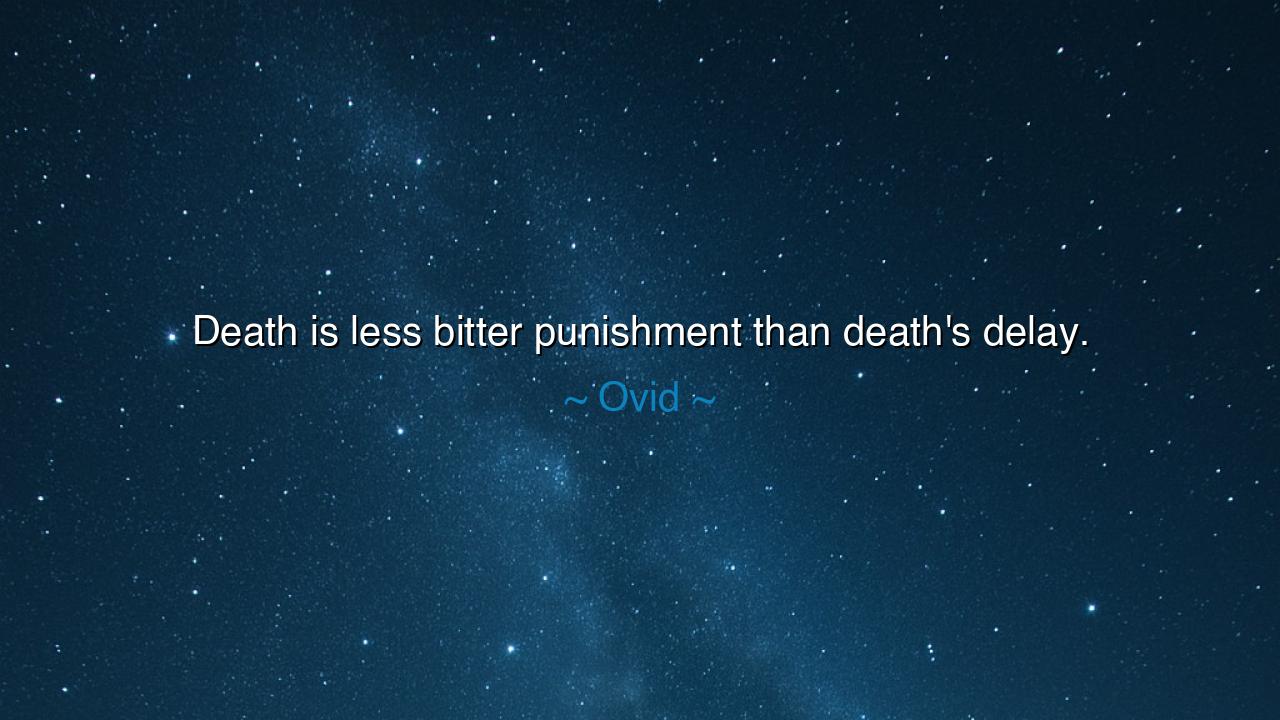
Death is less bitter punishment than death's delay.






The Roman poet Ovid, master of passion and exile, once wrote with the weary wisdom of a man who had seen life stripped of illusion: “Death is less bitter punishment than death’s delay.” These words, though ancient, pierce the modern heart with the same sharpness they held in the age of emperors. They speak not merely of dying, but of suffering through the endless waiting for death—of that slow erosion of spirit when one lives not to live, but only to endure. Ovid, who himself was banished from Rome to the barren shores of Tomis, wrote these lines while gazing upon the cold, empty sea — far from the warmth of his friends, his art, and his homeland. It was there that he learned the bitter truth: that life without purpose can be a harsher sentence than death itself.
To understand this saying is to see beyond the surface of mortality. Death is feared because it is final — the closing of the book, the end of all striving. Yet the delay of death, the long twilight of despair where the flame of hope burns low, can be far crueler. For in that waiting lies a deeper agony: the fading of meaning, the weight of loneliness, the gnawing emptiness of time without joy. The body may still breathe, but the soul feels entombed. Thus Ovid calls such lingering existence a punishment, not because he despised life, but because he loved it so fiercely that its absence — even while living — was unbearable.
Throughout history, we have seen this truth unfold in many forms. Consider the life of Socrates, who, when condemned to death, drank the hemlock without fear or bitterness. He did not cling to the passing breath, for he knew that to die with integrity was nobler than to live in compromise. In contrast, how many men have lived long lives imprisoned in their own cowardice — afraid to speak truth, afraid to act, afraid to let go? Such souls are not truly alive; they linger in the delay, their hearts beating but their purpose dead. To such men, Ovid’s lament becomes prophecy: death would not be the bitter end, but the merciful release from a life unlived.
Ovid’s own fate mirrors this tragedy. Once celebrated in the marble halls of Rome, he fell from imperial favor and was cast into exile — condemned not to die, but to live without his art, his city, his identity. In that desolation he came to see how the delay of death is the cruelest of torments. The waves of the Black Sea whispered eternity, yet would not claim him. His punishment was to exist without belonging, to remember beauty but never touch it again. Thus his words are born not of philosophy alone, but of deep, personal sorrow — the wisdom of a man who had tasted both the glory of life and the emptiness of survival.
There is also a spiritual lesson within his lament. For the delay of death is not only the fate of the aged or the exiled — it can dwell within any heart that has lost its reason for being. When a person ceases to dream, ceases to strive, when love fades and the will to grow is extinguished, they live in the shadowed realm Ovid describes. Their days pass like ghosts through the corridors of time. It is not the body’s death they suffer, but the slow death of meaning, the erosion of the soul’s fire. In that sense, to awaken the spirit — to find purpose, to act, to love again — is to be reborn from this living death.
Yet Ovid’s reflection is not without hope. His very writing, though steeped in sorrow, is an act of defiance — proof that the human soul can wrestle beauty from despair. He transforms his punishment into poetry, his exile into eternal remembrance. By giving voice to his suffering, he turns delay into creation, proving that even when life feels emptied, meaning can still be made. In this way, Ovid shows that while death’s delay may be bitter, it need not be wasted. One may still carve wisdom from pain, art from exile, and peace from endurance.
So learn this, O seeker of truth: do not fear death, but fear living without life. If death is inevitable, let it find you alive — burning with purpose, loving without restraint, creating, giving, daring. Do not linger in the gray lands of delay, where the soul forgets its own light. Instead, live as the ancients urged: with courage, with meaning, with gratitude. For though death may come to all, only those who truly live can say they have conquered it. And thus Ovid’s sorrow becomes our reminder — that the sweetest triumph over death is not survival, but living fully before the end.






AAdministratorAdministrator
Welcome, honored guests. Please leave a comment, we will respond soon